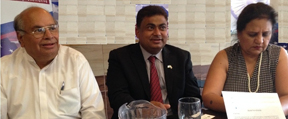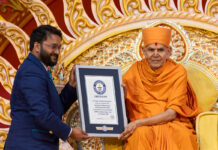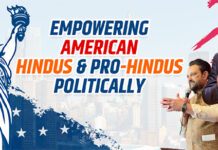
CHICAGO: Two Indians and three associations – that is the standing joke concerning the Indian American community. It means one for each and the third combined. This reflects the state of affairs with different groups in the community pulling in different directions which has been impacting adversely on the common interests of the community, feels a group of right minded people, including second generation Indian Americans.
It is in this context that two moves – both unrelated – were initiated last week, one by seasoned activists while the second one by second generation Indian youth. Both have a way common aim – getting the community united to project its views to the right people and further its interests in the right direction.
A group of seasoned community activists – Vandana Jhingan, Harendra Mangrola, Sohan Joshi, Krishna Banal, Vinesh Virani and many others – have decided to set up Indian American Political Action Committee (IPAC) to work in building civic awareness and leadership while educating our legislators on social and business issues of our community and ask for their support on key legislative initiatives.
Indian American Community has grown significantly in Illinois in the past few years, two decades for sure. An estimate is that 400,000+ people of Indian origin are residing in Illinois State. Besides the growth in numbers, it is a generally held that they constitute among the most educated and affluent wing of society at large that is engaged in the development of the State. The legislative decisions of elected officials greatly influence the manner in which the life and business are delivered in Illinois, but sadly this academically and economically powerful group lacks muscle to influence the legislative process at the State or even local level.
The purpose of IPAC is to identify, train and help candidates of Indian origin, who have demonstrated an understanding, interest, and commitment for the betterment of Illinois State while serving the needs of Indian American community. To the extent necessary to achieve its purpose, IPAC may also educate citizens of Indian origin about the political process and encourage their participation through outreach and advocacy efforts. It will also hold forums and provide endorsement to candidates in key races based on service to Indian American community, irrespective of their party affiliation.
IPAC will work on promoting civic education by holding seminars and sessions while conducting voter registration camps. The best potential candidates probably have never considered running for elected office.
For the races involving local, state and federal in Illinois, IPAC will work on identifying citizens of Indian origin who have potential, interest as well as have demonstrated their desire for serving the community and not self-serving. It will provide education, guidance and training to such candidates on issues, processes and election campaign.
IPAC will hold candidate forums in key races of Interest to Indian American community and plans to send out a questionnaire to candidates to understand their stand related to community interests. It will also provide endorsements and contributions to key campaigns. From time to time IPAC leadership will be involved in lobbying with Federal, State and Local elected officials regarding issues related to Indian American community.
Vandana Jhingan, Sohan Joshi and Krishna Bansal briefed ethnic Indian press on this subject last week at a meet on Devon Avenue and it was hinted that a bigger meet of many prominent community leaders is planned to give credence to the idea and get wider community support.
Meanwhile, a move is afoot by second generation Indian American youth Nirav Virani to get different groups within the community to get united and work for the common interest of the society rather than fritter away their time, energy and resources for personal ends.
The immediate goal is to get the two rival federations of Indian associations get united under one banner to end the sad spectacle of two India Day parades, two Republic Day banquets, two melas and everything done multiple times with same objectives. This will stop the ignominy of the community being a laughing stock before the public besides saving time and energy and money of the community.
Ramesh Soparawala
India Post News Service






